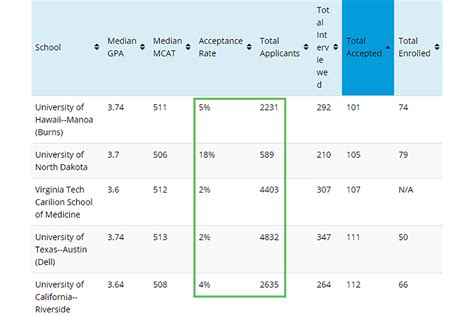Introduction

Medical school is a highly competitive field, and the admissions process is rigorous. One of the most important factors in the admissions process is the interview. Medical schools use interviews to assess an applicant’s communication skills, enthusiasm for medicine, and fit with the school’s culture.
The number of interviews that an applicant receives can vary depending on a number of factors, including the applicant’s academic record, MCAT score, and personal statement. However, according to the Association of American Medical Colleges (AAMC), the average number of interviews for accepted medical school students is 9.
Factors That Affect the Number of Interviews
There are a number of factors that can affect the number of interviews that an applicant receives. These factors include:
- Academic Record: Applicants with strong academic records are more likely to receive more interviews. This is because medical schools want to ensure that applicants have the academic skills to succeed in medical school.
- MCAT Score: The MCAT score is a standardized test that is used to assess an applicant’s knowledge of the natural sciences and critical thinking skills. Applicants with high MCAT scores are more likely to receive more interviews.
- Personal Statement: The personal statement is an opportunity for applicants to share their story and explain why they are interested in medicine. A well-written personal statement can help an applicant stand out from the competition.
- Letters of Recommendation: Letters of recommendation from faculty members, advisors, and other professionals can provide medical schools with valuable insights into an applicant’s character and work ethic. Strong letters of recommendation can help an applicant increase their chances of receiving an interview.
- Location: Applicants who apply to medical schools in their home state or region are more likely to receive more interviews. This is because medical schools tend to give preference to in-state applicants.
- Minority Status: Applicants from underrepresented minority groups are more likely to receive more interviews. This is because medical schools are committed to increasing diversity in the medical profession.
Strategies for Increasing Your Chances of Getting Interviews
There are a number of strategies that applicants can use to increase their chances of getting interviews. These strategies include:
- Applying Early: The earlier you apply to medical school, the more likely you are to receive interviews. This is because medical schools begin reviewing applications as soon as they are received.
- Applying to Multiple Schools: The more medical schools you apply to, the more likely you are to receive interviews. This is because you are increasing your chances of being selected for an interview at at least one school.
- Tailoring Your Application to Each School: Each medical school has its own unique requirements and preferences. It is important to tailor your application to each school to increase your chances of getting an interview.
- Practicing for Your Interviews: The interview is an important part of the admissions process. It is important to practice for your interviews so that you can make a good impression on the interviewers.
Conclusion
The average number of interviews for accepted medical school students is 9. However, the number of interviews that an applicant receives can vary depending on a number of factors. Applicants can increase their chances of getting interviews by applying early, applying to multiple schools, tailoring their application to each school, and practicing for their interviews.
Frequently Asked Questions
1. How many medical schools should I apply to?
The number of medical schools that you should apply to depends on a number of factors, including your academic record, MCAT score, and personal statement. However, most experts recommend applying to at least 10-15 schools.
2. What is the best way to prepare for my interviews?
The best way to prepare for your interviews is to practice. You can practice by doing mock interviews with friends, family members, or a career counselor. You can also prepare by reading about the medical school interview process and by researching the schools that you are applying to.
3. What should I wear to my interviews?
It is important to dress professionally for your interviews. This means wearing a suit or business casual attire. You should also make sure that your clothes are clean and pressed.
4. What should I bring to my interviews?
You should bring a copy of your CV, a list of your references, and a transcript of your academic record to your interviews. You may also want to bring a portfolio of your work or a letter of recommendation from a mentor.
5. What should I expect during my interviews?
During your interviews, you will be asked a variety of questions about your academic record, MCAT score, personal statement, and experience. You will also be asked about your motivations for pursuing a career in medicine.
6. How can I increase my chances of getting accepted to medical school?
There are a number of things that you can do to increase your chances of getting accepted to medical school. These things include:
- Getting a strong academic record
- Getting a high MCAT score
- Writing a well-written personal statement
- Getting strong letters of recommendation
- Applying early
- Applying to multiple schools
- Tailoring your application to each school
- Practicing for your interviews
